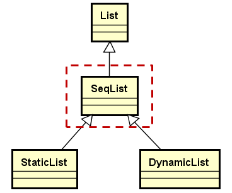1,本文完成顺序存储结构线性表的抽象实现:
1,SeqList 还是一个抽象类,这里仅实现线性表的关键操作,但是还是不能生成具体对象;
2,关键操作虽然指定,但是顺序存储的指定没有在 SeqList 中完成,所以还是抽象类,不能生成具体对象;

2,SeqList 设计要点:
1,抽象类模板,存储空间的位置和大小由子类完成;
2,实现顺序存储结构线性表的关键操作(增删查等);
3,提供数组操作符,方便快速获取元素(因为是顺序存储结构,可以重载数组操作符);
3,SeqList 具体函数接口(增删设获长清操容):

4,顺序存储线性表实现:
1 #ifndef SEQLIST_H 2 #define SEQLIST_H 3 4 #include "Object.h" 5 #include "List.h" 6 #include "Exception.h" 7 8 namespace DTLib 9 { 10 11 template <typename T> 12 class SeqList : public List<T> 13 { 14 protected: 15 T* m_array; //顺序存储空间,子类实现,这里不赋值指针 16 int m_length; //当前线性表长度 17 18 public: 19 bool insert(int i, const T& e) // n + 5 => O(n) 20 { 21 bool ret = ((0 <= i) && (i <= m_length)); 22 ret = ret && (m_length <= capacity()); // 要插入元素,当插入后长度要加 1,此时小于号正好合适 23 24 if( ret ) 25 { 26 for(int p=m_length-1; p>=i; p--) // 基于顺序表的插入要涉及数据向后挪动空出目标位置,向后移动则从后开始 27 { 28 m_array[p + 1] = m_array[p]; // 这里数组操作符实质是指针运算 29 } 30 31 m_array[i] = e; 32 m_length++; 33 } 34 35 return ret; 36 } 37 38 bool insert(const T& e) // 在线性表的尾部插入一个元素; 39 { 40 return insert(m_length, e); 41 } 42 43 bool remove(int i) // O(n) 44 { 45 bool ret = ((0 <= i) && (i < m_length)); 46 47 if( ret ) 48 { 49 for(int p = i; p<m_length-1; p++) // 基于顺序表的删除要涉及数据向前挪动,向前移动则从前开始 50 { 51 m_array[p] = m_array[p + 1]; 52 } 53 54 m_length--; 55 } 56 57 return ret; 58 } 59 60 bool set(int i, const T& e) 61 { 62 bool ret = ((0 <= i) && (i < m_length)); 63 64 if( ret ) 65 { 66 m_array[i] = e; 67 } 68 69 return ret; 70 } 71 72 /* 通过参数 e 来返回目标位置,而没有通过返回值返回,是由于目标位置可能不合法,不合法就返回 false,也就是 get() 操作用来说明当前操作是否合法*/ 73 bool get(int i, T& e) const 74 { 75 bool ret = ((0 <= i) && (i < m_length)); 76 77 if( ret ) 78 { 79 e = m_array[i]; 80 } 81 82 return ret; 83 } 84 85 /* 86 int get(int i) const 87 { 88 int ret = -1; 89 90 if(get(i, ret)) 91 { 92 return ret; 93 } 94 95 return ret; 96 } 97 */ 98 99 int find(const T& e) const //O(n) 100 { 101 int ret = -1; 102 103 for(int i=0; i<m_length; i++) 104 { 105 if(m_array[i] == e) 106 { 107 ret = i; 108 109 break; 110 } 111 } 112 113 return ret; 114 } 115 116 int length() const 117 { 118 return m_length; 119 } 120 121 void clear() 122 { 123 m_length = 0; 124 } 125 126 // 顺序存储线性表的数组访问方式,也是一般的访问方式; 127 T& operator[] (int i) 128 { 129 bool ret = ((0 <= i) && (i < m_length)); // 必须先插入数据元素,然后才能访问 130 131 if( ret ) 132 { 133 return m_array[i]; 134 } 135 else 136 { 137 THROW_EXCEPTION(IndexOutOfBoundsException, "Parameter i is invalid ..." ); 138 } 139 } 140 141 // 这里考虑了 const 和非 const 对象 142 T operator[] (int i) const 143 { 144 return (const_cast<SeqList<T>&>(*this))[i]; 145 } 146 147 //顺序存储空间的最大容量,顺序存储空间的指定没有在这个类中指定,在//其子类中完成的,所以具体实现要放在子类中完成; 148 virtual int capacity() const = 0; 149 }; 150 151 } 152 #endif // SEQLIST_H
5,顺序链表测试代码:
1 #include <iostream> 2 #include "SeqList.h" 3 4 using namespace std; 5 using namespace DTLib; 6 7 int main() 8 { 9 SeqList<int>* l; 10 return 0; 11 }